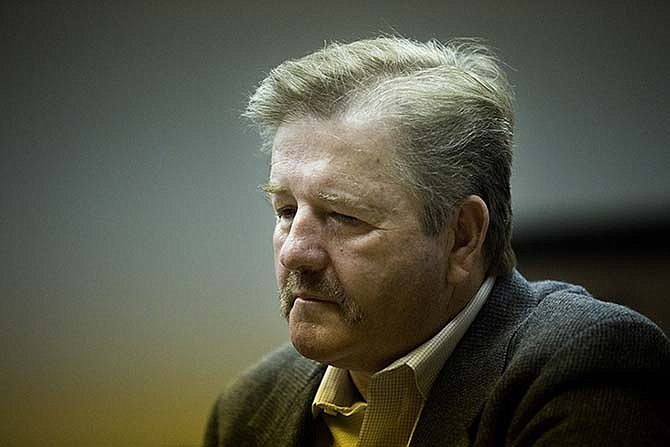In two weeks, Kurt Steidley will know whether he's getting a new trial or being sentenced on his jury conviction for second-degree arson.
A Cole County jury convicted Steidley, 53, Knob Noster, on Jan. 14 of setting the Jan. 1, 2011, fire that caused heavy damage to Everhart's Sporting Goods, 2436 Missouri Blvd., which Steidley owned and had closed the week before.
But Steidley's attorney, Shane Farrow, wants Judge Dan Green to order a new trial because, Farrow said, the prosecution didn't disclose before the trial a statement interim Jefferson City Fire Chief Jason Turner expected to make during the trial.
When Turner testified during the trial about his conversation with Steidley after the fire, Farrow reminded Green during a Wednesday morning hearing. "I raised an objection that that statement had not, previously, been disclosed by the state.
"The court, after some discussion, determined to strike the statement from the record and advised the jury that that testimony had been stricken."
But, Farrow said in court Wednesday and in a five-page "motion for new trial" he filed Feb. 6, Prosecutor Mark Richardson raised the same issue later in the trial, during his cross-examination of Steidley.
And Green allowed the testimony then, over Farrow's objections.
"When the court struck that testimony, I think the defendant was entitled to understand, and believe, that that testimony wasn't going to come back in the trial," Farrow told Green.
Turner testified that, during a conversation the day after the fire, Steidley said he fell and hurt his head as he was getting ready to come to Jefferson City after hearing about the fire, so he went to the hospital instead.
But, Farrow reminded Green on Wednesday morning, Steidley's defense included "that he fell from a grain bin, a storage bin, earlier in the day."
Farrow's new trial motion argues that the prosecution violated the legal "discovery" process by failing to provide advance notice of Turner's testimony.
The process is intended to eliminate the kinds of surprises in a real trial that often are used for dramatic effect in movies and television shows.
In his written motion, Farrow said knowing about Turner's version of the conversation with Steidley would have resulted in taking Turner's deposition before the trial, "to determine what, precisely, Chief Turner recalled about the making of the statement, the context, and why Chief Turner waited two and a half years to disclose it to the state."
During Wednesday's hearing, Richardson told Green to reject Farrow's motion and impose Steidley's sentence.
"The substance of that statement was disclosed by written letter to the defense attorney prior to the trial," Richardson said. "There was no discovery violation by the state."
Richardson argued Green was right to allow the statement during cross-examination, because, "The defendant advanced at least three different versions of his head injury - (and) it's up to the jury to decide which is true and which is not."
But Farrow reminded Green that the written motion showed the prosecution said they had become aware of Turner's visit with Steidley on Jan. 2, 2011, but didn't provide the specific details - so Farrow didn't know there was a disagreement.
In the written motion, he argued: "Introduction of the undisclosed statement at trial on two separate occasions resulted in fundamental unfairness to the defendant, and the court's failure to grant a mistrial constituted an abuse of discretion."
Green promised to rule on Farrow's motion before the next hearing, on March 26.

